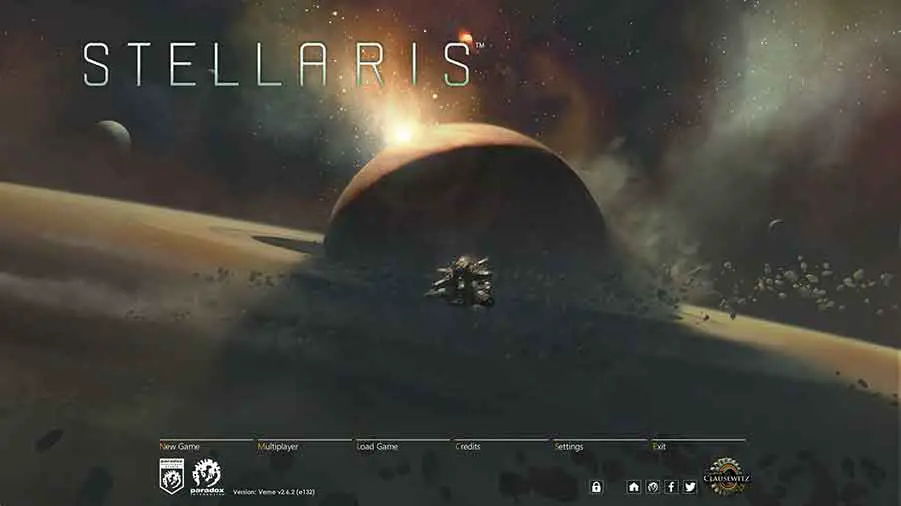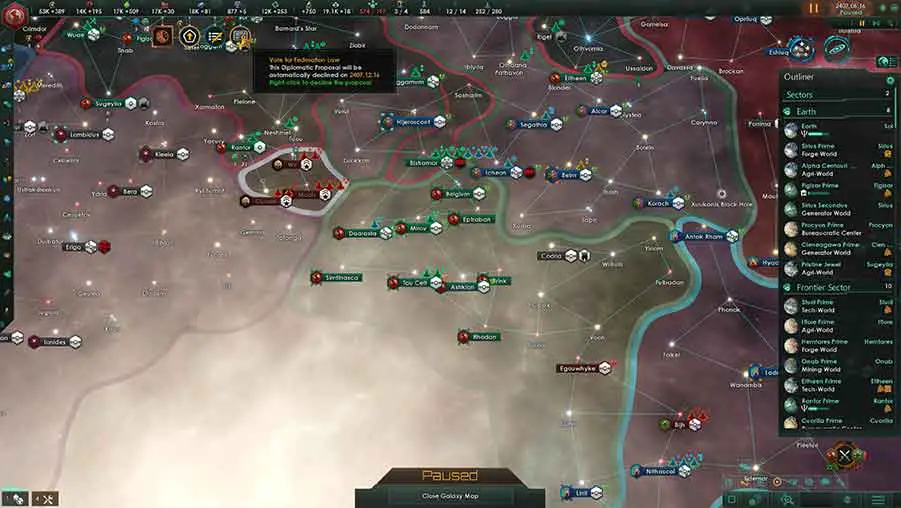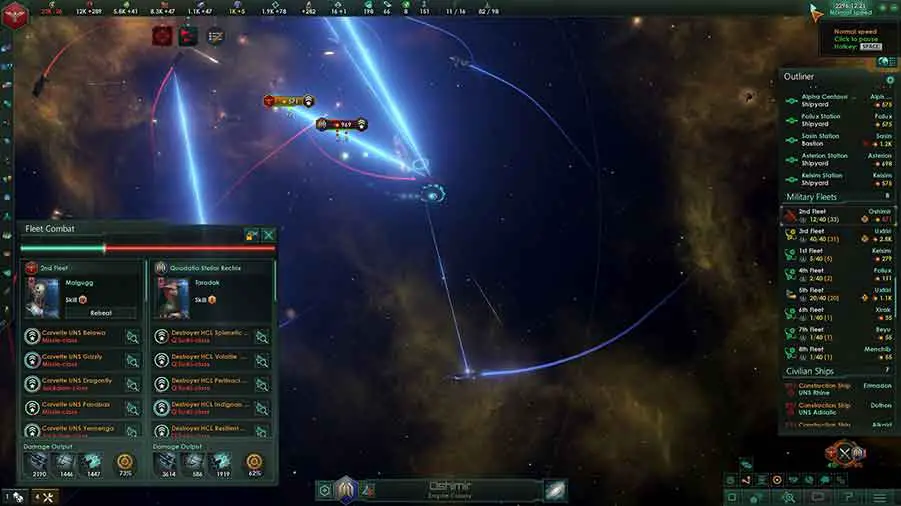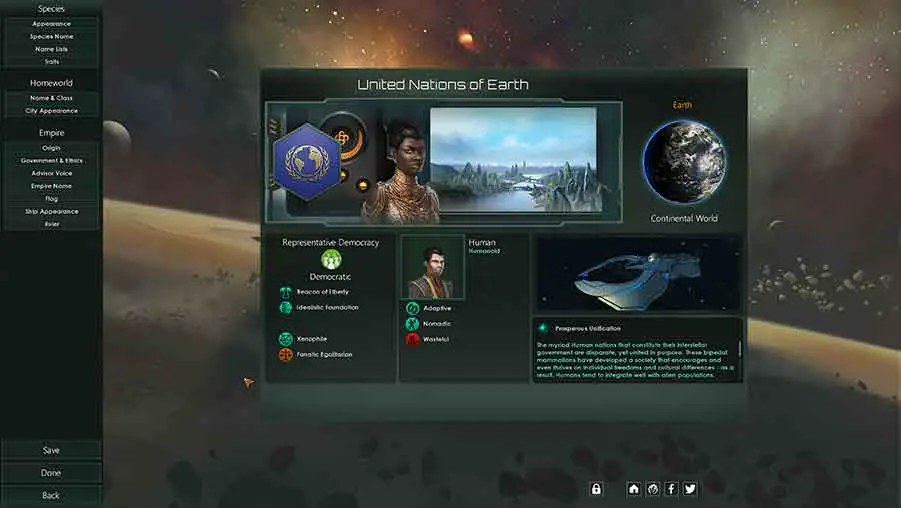
If anything is described as a grand strategy space game, then the Stellaris PC game from Paradox clearly falls into that category. Stellaris is a pausable real-time strategy game set in outer space. Starting as a single planet your empire explores the galaxy and strives to become the star spanning empire it was destined to become. Stellaris was recently updated with the Verne 2.6 patch along with the release of the Federations DLC. You can read an updated review for 2022 here.
Stellaris is definitely a game worth playing. Its most outstanding features are the amount of depth to the game like research, exploration, economic management, plus you get the satisfaction of grinding your enemies into dust and ruling the galaxy, which adds immensely to the experience.
I’ve tried a few Paradox grand strategy games in the past and they simply overwhelmed me. Stellaris was a welcome change, Paradox has made it very easy to play and learn without all the complicated learning processes, game mechanics and strategies you need to go through with their other games. I was looking for a grand strategy game set in space and this one was almost exactly what I was looking for. With some reservations I bought it when it first came out and I have never been disappointed with it since then. It’s a fantastic game that just gets better with each new patch and DLC.
The Early Game
The early game is full of mystery and intrigue and keeps you involved right from the start. One of the first things you’ll do is send your science ship out into the great unknown, looking for other life and planets to exploit. And when you explore you feel like you’re really exploring something by encountering anomalies, aliens, archaeological sites, anomalies and special events. It just feels like the real thing. If you’re new to Stellaris feel free to check out our 101 Tips for Beginners.
As a new space faring race your empire will be hungry for resources so building mining stations is a must. While your science ships focus outwards your scientists focus inward, researching new technologies to keep your young empire flourishing. Your leaders will focus on your empire’s infrastructure by construing planetary buildings to support power generation, research, food, and exotic foundries designed to utilize the resources your science ships discover in space.

The game has a lot of depth, diversity, and the type of uncertainty that makes it interesting and fun, even without any of the DLCs. Research doesn’t follow any set pattern but is randomly generated, although the game won’t skip tiers of research. The interesting part is that you can influence what type of research is offered next. If you have a research scientist who specializes in Rocketry, then items in that field are more likely to be offered.
The diversity even flows down the race you can play whether its humans, birds, cute little cuddly things, or anything other type of interesting weird alien, along with their ethics and government type.
Read More: So you have Stellaris but is Stellaris Federations worth adding?
Exploration is probably the most interesting aspect at the start of the game. Finding habitable planets is a must for your space faring race to grow, and you just never know when you’re going to run into a new friend or foe, or if that last star you explored awakened some ancient empire that has long since lost any interest in expanding, but is more than willing to deal with you if you tick them off.
Eventually you’ll run into someone with a chip on their shoulder and you’ll have to fight. Preparing your empire for that day, and strategically placing your fleets so they are ready to get to the battle front as quickly as possible, is a challenge. The warscore system in this game is fantastic so even if you fight and lose an early war, you won’t be decimated militarily or economically. You might lose some territory, but it won’t handicap you enough to cost you the game. And the galactic space battles are epic!
You will literally lose hours of your life as you fiddle with right combination of buildings for your planets, excavate archaeological sites if you have the Ancient Ruins DLC, or deal with a United Nations in Space if you have the new Federations DLC, all while keeping a suspicious eye on your neighbors.
During the late early-game to the start of the mid-game Federations come into play and if you have the Federations DLC (read about here at our website) they become that much more fun to manage. You’ll need those allies if you want to survive those paranoid neighbors who want to rule everything and team up against you. Of course, if they do conquer and you do you survive their conquest, they might even allow you to serve them. There is safety in numbers and that’s what’s needed in this part of the game.
Unlike almost every other strategy game, even the end-game is interesting and fun. With an end-game crisis, like an invasion by the Unbidden, you can still lose everything. This makes the end-game interesting. You might be the biggest bully in your galaxy but there is always that new neighborhood bully around the corner, or from the next dimension or galaxy, to deal with.
War and Warscore

The warscore system is what keeps you from getting wiped out if you lose, but on the other hand it makes it tough to wipe out your opponent in one massive blow as well. Your goals will determine how high a warscore you need to obtain to win the war. War score is influenced by a lot of things, and the in game tootips will tell you exactly what that is after war is declared. Warscore is ultimately determined by your war goals.
Basically the way warscore works is that the greedier you are the harder it is to win the war decisively because of the higher war goal number. The more systems you claim adds 10 to the war goal, and each planet claimed adds 100. Having a superior Navy offsets that score somewhat but it’s a marginal help at best if you have a massive war goal to achieve. Any Allies helping you in the war will have their warscore added to yours, making the overall war goal that much higher.
With a high war goal number war exhaustion may kick in before you can meet the goal, forcing you into peace terms you may not like. The main combatants have the option to settle the war through a Status Quo Peace and the war goal for this will usually be much lower than the Conquer warscore. With this type of peace any systems you’ve claimed and occupied are kept and any systems that were claimed by your enemy and occupied by them are lost. If you’ve already taken what you want and haven’t lost anything this is a very good option since you won’t get any more territory if your enemy surrenders anyway.
Combat in Stellaris is glorious but mostly automated. Ship stances can be set and fleets can be designed according to the enemy you’re facing, but if you’re looking for direct ship control you’ll be disappointed. Not having to control individual ships in Stellaris is a good thing though, since battles can involve hundreds of ships, making it impossible to micromanage each ship a battle.
The combat graphics are wonderful. You can zoom in and watch ships fire on each other as they maneuver for a superior firing position. And watching those lasers lash out at the enemy is a beautiful thing.
One thing to keep in mind is that before entering a battle you can see your enemy’s estimated fleet strength and get an idea of how well you’ll do in battle. That’s not a guarantee of success, however. If your enemy has offensive weapons that capitalize on your fleet’s weakness, they could cut you to pieces even though your fleet was numerically superior. It’s always good to examine the enemy ship’s details prior to a battle if you can.
But before you can make war you need a casus belli.
Claims
One of the easiest ways to get a casus belli is to claim some of your neighbor’s systems. Claiming them will cost Influence, which is usually in short supply since it is used for other things as well, like expanding into new areas. I have an entire page dedicated to gaining Influence.
Claims cost is heavily influenced by how close the claimed systems are to your empire, if the clamed system has a starbase in it and if there is a colony in the claimed system. Some things that offset this cost are declaring a Rivalry or having the Nationalist Zeal civic.
The Claims system is deceptively simple. Rather than being a complex system of hurdles to jump through before making a claim and going to war, you just click the Claims icon and choose what systems you want to be yours. It costs influence and you may not have enough to claim every system you want, but now you’ll have that all-important casus belli, allowing you to declare war and expand your territory (if you win).
Setting up a game

At the game set up screen you’re presented with a vast array of choices. You can choose a preset civilization, edit an existing one or create a new one completely from scratch. You can set how many primitive races are in the galaxy, the galaxy size, how many AI empires you will play against, and what the “victory year” will be in game time, and that just scratches the surface of choices. In all there are over 20 parameters that can be set.
That only highlights part of the enjoyment for this game, which is its great diversity. If you want to edit and create a new empire you can set its appearance, traits, what its cities and ships look like, its government type and ethics, and its name, along with several other things. Each of these choices has a lot of options within it. For instance, under the traits option you can choose between good and bad traits (bad traits give you more trait points to work with at the expense of having to live with a bad habit, like being wasteful).
At the next screen you set the galaxy size and shape, AI difficulty and how aggressive the AI is. After setting all the parameters clicking the play button the game starts with VIR at your side, who is a very good advisor and will help you get off to a good start, unless you’ve turned the Advisor off. Turning the Advisor off if you’re new to the game is not a good idea since this is a game where the tutorial is pretty helpful. The action starts immediately and if you’re a new player having VIR as your Advisor helps you get through the learning curve a lot faster.
Check out our set up page for detailed info about the best starting settings for a Stellaris game.
Resources
As you explore you’ll discover all kinds of resources, some that are common, like energy and minerals, and some that are rare and might not be unusable until you’ve done the right research, like exotic gases that are used for advanced weaponry on your ships. Food is the only thing you can’t harvest in space unless you install a hydroponic bay on a starbase. Food is mainly produced on planets, and like all things in Stellaris, some planets are better suited for food production than others.
The mainstay for producing food on a planet is the Agricultural District. It provides a large amount of food for the planet and empire, plus it creates jobs to keep those pesky pops happy and productive.
Research
Research in Stellaris is different from other games and differs in a pleasant, if somewhat confusing, way. There is no structured research tree to choose from that lets you the path you need to take to get those Devastator Torpedoes you’ve always wanted. The connection between the early choices and what they lead to is not clear, but that’s part of the intrigue and fun.
In Stellaris, at the start of the game, you have three research branches, physics, engineering, and biology, all of which can have ongoing research at the same time unless you interrupt the progress on one of them and assign your research scientists to a special project. Each branch, at the start of the game has three options to choose from too. As the game progresses you need to be careful not to ignore those cheap, seemingly insignificant options, since they may block the path to a much better technology.
Diplomacy
The biggest needed improvement for Stellaris is diplomacy and the new Verne 2.6 patch along with the Federations DLC is a giant stride toward addressing that, Envoys now exist to either improve or even harm relations between two empires. Although diplomacy is now deeper and more meaningful it still lacks something. Diplomacy with other empires feels a little artificial with no real personality for the alien empires. The dialog text is there, and is very good, but I think making it a little more personal would go a long way toward making diplomacy better, I need to feel like I have a friend I’m letting down in a time of trouble if I don’t help out.
The other glaring omission, one that I hope Paradox addresses with a DLC in the future, is espionage. As the game says, “knowledge is the key to power” and knowing your enemy is included as well. During the mid-game, when you’ve met most empires, it would really be good to know their strengths and weakness, like what the primary offensive and defensive weapons are on their ships. Knowing that could enable you to build smaller fleets packed with the type of firepower and defenses you need to fight and defeat them decisively.
Sabotage is another element that could be added. There’s nothing as satisfying as blowing up a strategic shipyard or inciting a riot to soften someone up before attacking.
Victory
At the start of the game you get the opportunity to set the victory year, doing nothing will automatically set it to the year 2500. With a game starting year of 2200 that gives you a meager 300 years to achieve victory. The player with the highest victory score at the end of that year is declared the winner although you can keep playing well after that if you want to.
The victory score includes factors like economic strength, technology level, how many systems and colonies you own, the number of relics recovered, plus 10% of the score from everyone who is a member of your federation. Although military strength is not a direct factor it does affect how many colonies you can capture and maintain control over, so military strength and winning wars is still a big factor in winning.
UI and Sound
The User Interface is sleek and easy to use, with all the important things just one or two clicks away. One thing that’s nice is that if you get tired of the UI screens popping up when you inadvertently mouse over them, they can either be locked in place or minimized. The menus will then only expand when you click on an icon. Paradox has put a lot of effort into making the User Interface streamlined and easy to use, and they’ve done very well at achieving that. The UI lets you easily zoom in and out or change views. You can go from micromanaging a planet to surveying the entire galaxy in one simple click and mouse scroll.
Something that’s nice are the soundtrack options. The game soundtrack can be paused, or the current music even changed, if it gets annoying or tiresome. The soundtrack for this game is really outstanding and adds a great amount of impressiveness to the game.
Conclusion
Don’t forget to visit my YouTube channel at https://www.youtube.com/channel/UCcWU6qxVisK93h5guKRVtdg
Is Stellaris worth it? I could easily write an article twice as long about this game just answering that question. There’s so much more that could be said about this game, like the fleet manager, ethics, government type, traditions, the influence system and how it works and the ship designer (that’s still not everything), but the bottom line is that this is a very, very deep and diverse game. If you like space games with some combat and a lot of strategy and exploration, you’ll love this game.
